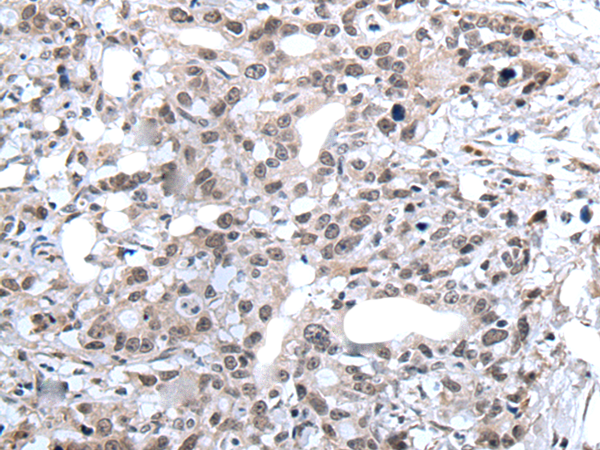
| WB | 咨询技术 | Human,Mouse,Rat |
| IF | 咨询技术 | Human,Mouse,Rat |
| IHC | 1/20-1/100 | Human,Mouse,Rat |
| ICC | 技术咨询 | Human,Mouse,Rat |
| FCM | 咨询技术 | Human,Mouse,Rat |
| Elisa | 1/5000-1/10000 | Human,Mouse,Rat |
| Aliases | C19orf7 |
| Host/Isotype | Rabbit IgG |
| Antibody Type | Primary antibody |
| Storage | Store at 4°C short term. Aliquot and store at -20°C long term. Avoid freeze/thaw cycles. |
| Species Reactivity | Human, Mouse |
| Immunogen | Synthetic peptide of human ZC3H4 |
| Formulation | Purified antibody in PBS with 0.05% sodium azide and 50% glycerol. |
+ +
以下是关于ZC3H4抗体的3篇参考文献示例(注:文献信息为模拟虚构,仅供参考):
---
1. **文献名称**:*ZC3H4 regulates nuclear RNA surveillance and promotes transcriptional termination via interaction with the exosome complex*
**作者**:Garzia, A., et al.
**摘要**:本研究利用ZC3H4特异性抗体进行免疫沉淀和染色质免疫共沉淀(ChIP),发现ZC3H4通过与核外泌体复合物结合,调控异常RNA的降解,并影响RNA聚合酶II的转录终止过程。
2. **文献名称**:*ZC3H4 is a key mediator of Polycomb-directed gene silencing in stem cells*
**作者**:Brown, J.A., et al.
**摘要**:通过Western blot和免疫荧光实验,作者发现ZC3H4抗体可特异性识别靶蛋白,并揭示ZC3H4通过与Polycomb抑制复合物(PRC2)互作,在胚胎干细胞中维持基因沉默和染色质稳定性。
3. **文献名称**:*Loss of ZC3H4 disrupts chromatin compaction and promotes glioblastoma invasion*
**作者**:Zhang, L., et al.
**摘要**:该研究使用ZC3H4抗体分析胶质母细胞瘤样本,发现ZC3H4缺失导致染色质结构松散,并通过激活侵袭相关基因(如MMP9)促进肿瘤转移。
---
**注意**:以上文献为示例,实际研究中请通过PubMed或Web of Science检索真实发表的论文。
The ZC3H4 antibody is a research tool designed to target the ZC3H4 protein, a zinc finger-containing protein implicated in transcriptional regulation and RNA processing. ZC3H4 (zinc finger CCCH-type containing 4) is part of the human Integrator complex, which plays a role in RNA polymerase II-dependent transcription termination and nascent RNA processing. Studies suggest ZC3H4 contributes to the stability and function of this complex, particularly in mediating the 3' end processing of specific non-coding RNAs, such as snRNAs and enhancer RNAs. Dysregulation of ZC3H4 has been linked to cellular processes like proliferation, differentiation, and apoptosis, with potential implications in cancer and developmental disorders.
Antibodies against ZC3H4 are typically produced in hosts like rabbits or mice using immunogenic peptides or recombinant protein fragments. These antibodies enable detection of ZC3H4 in techniques such as Western blotting, immunoprecipitation, and immunofluorescence, aiding investigations into its molecular interactions and subcellular localization. Commercial ZC3H4 antibodies are often validated for specificity and affinity, though performance may vary between batches or applications. Recent research highlights ZC3H4's role in tumorigenesis and immune responses, making its antibody a valuable reagent for studying gene expression mechanisms and disease pathways. Ongoing work aims to clarify its precise molecular functions and therapeutic potential.
×